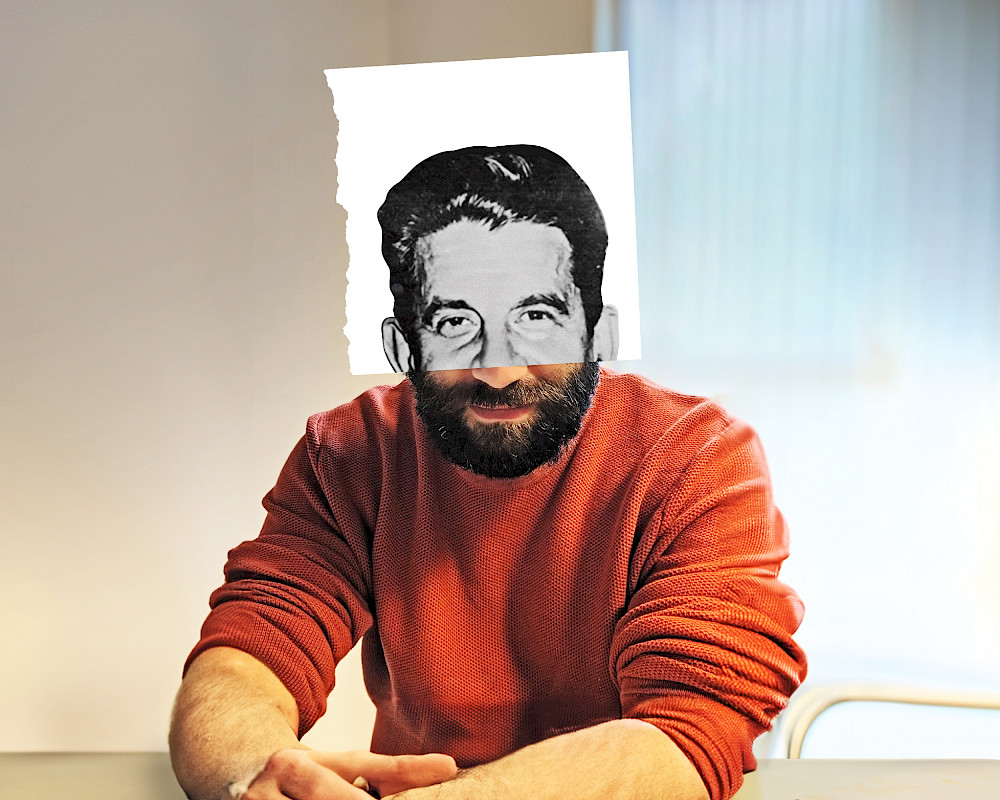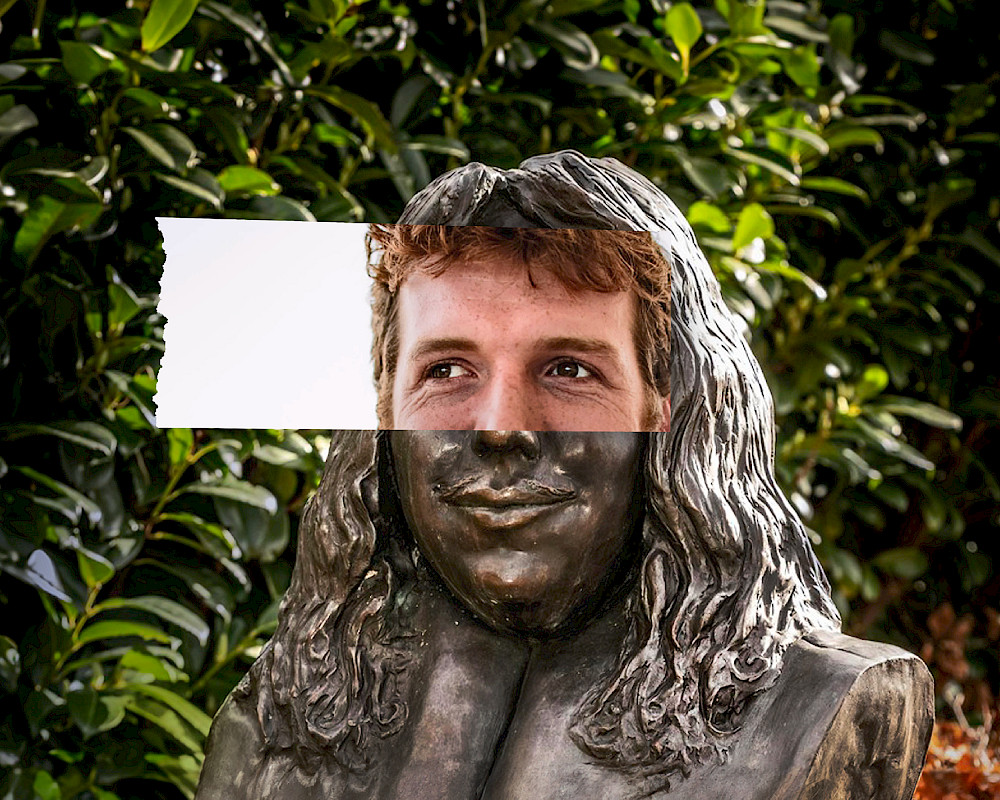essay
Productively Unproductive
Arne Willée
Arne Willée is a philosophical thinker, educator, and a generalist. He studied philosophy and literature in Germany and got his PhD from Indiana University in the US. He is interested in the interrelationships between aesthetics, epistemology, and politics and more specifically games, narrative texts, community-building, and idleness.
Milo Sharafeddine
Milo is a Lebanese visual artist and writer based in The Hague. Their work is often inspired by the instability of personhood, place and its social meaning, ghosts and haunted symbolism, and technology—specifically digital imagery and recording, internet-age media, and their alternative histories.
video
Air
Nonlinearity is not just a collision of times, but an indifference to time

essay
Ghosthood and the Uncomfortable Familiarity of Haunting
now you tell me I remind you of a friend, but one that you can't seem to name
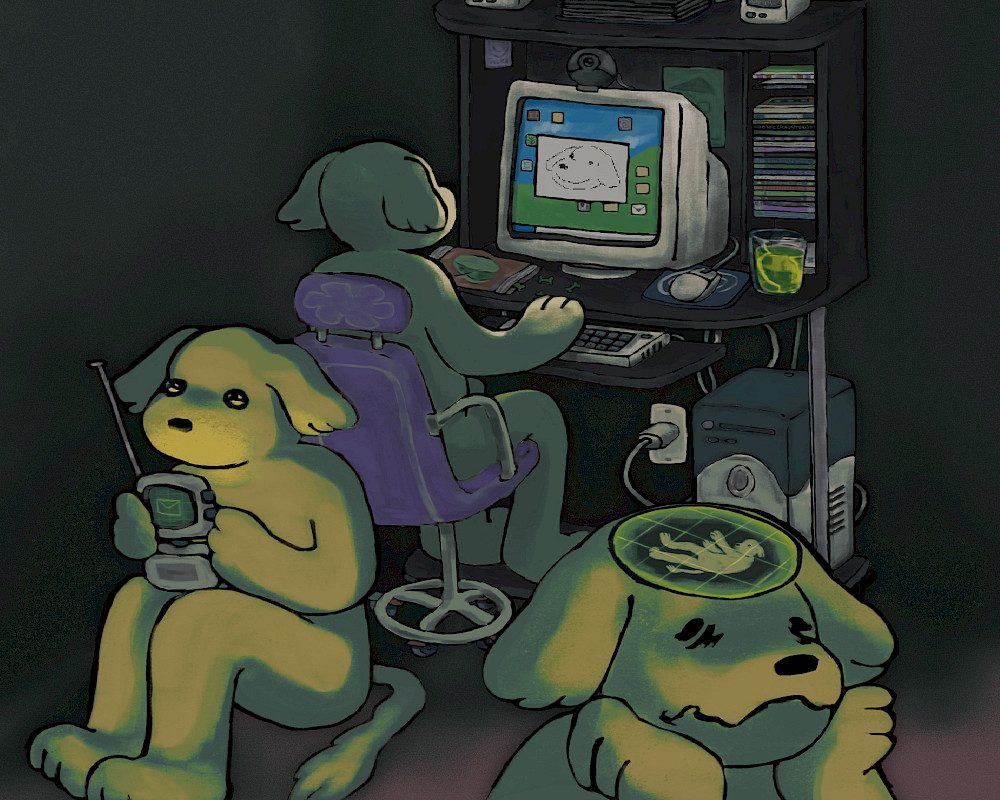
essay
Escape From the Internet
“Remember when on the internet no one knew you were a dog?"
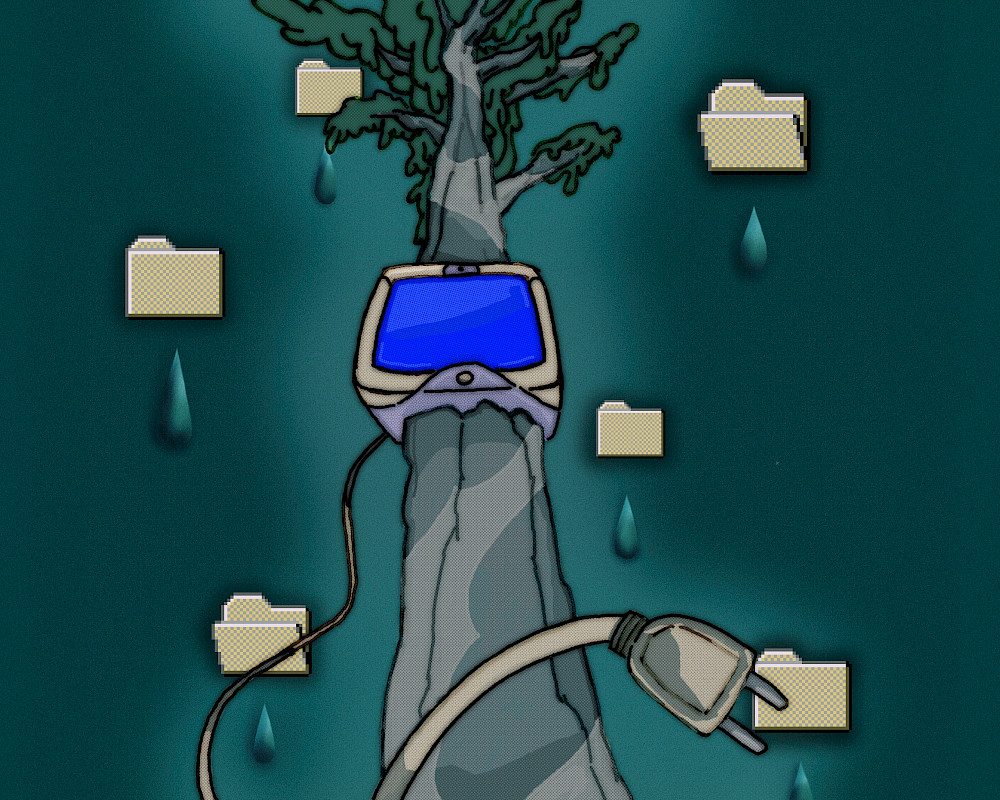
poetry
The horizon shifts as I do
Did you know that sequoia trees can grow taller than data centres can?
In the outskirts of Amsterdam, there are many of the latter, corrupting the horizon.
18
min read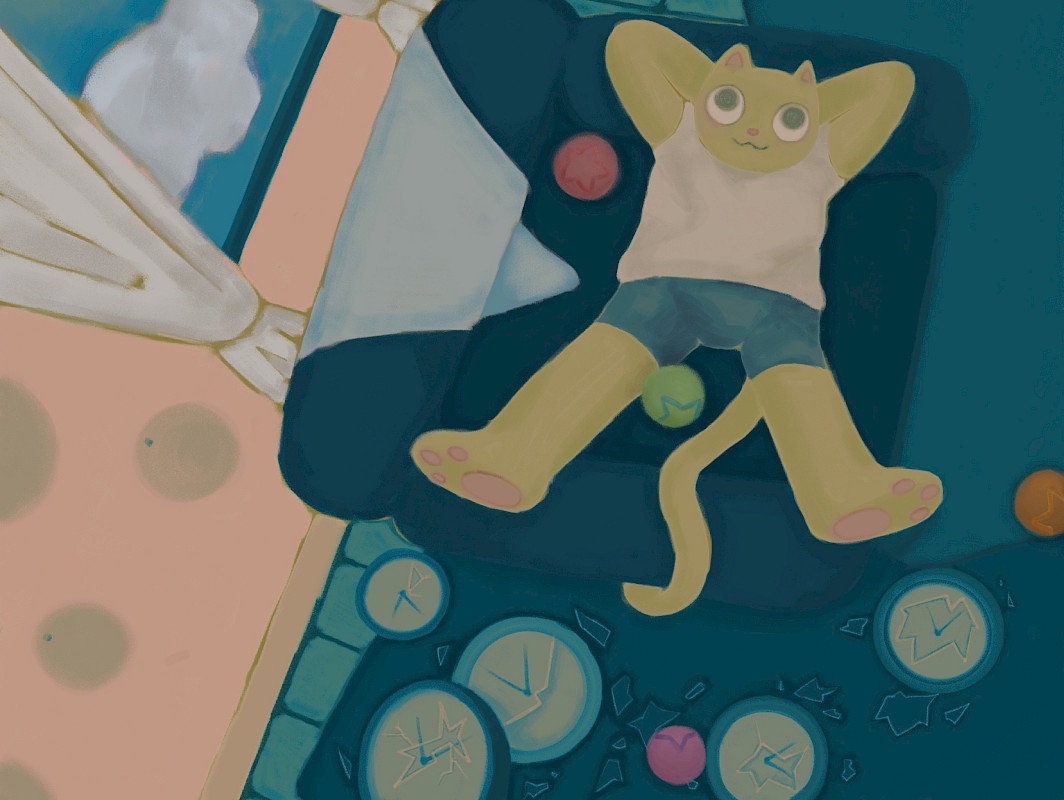
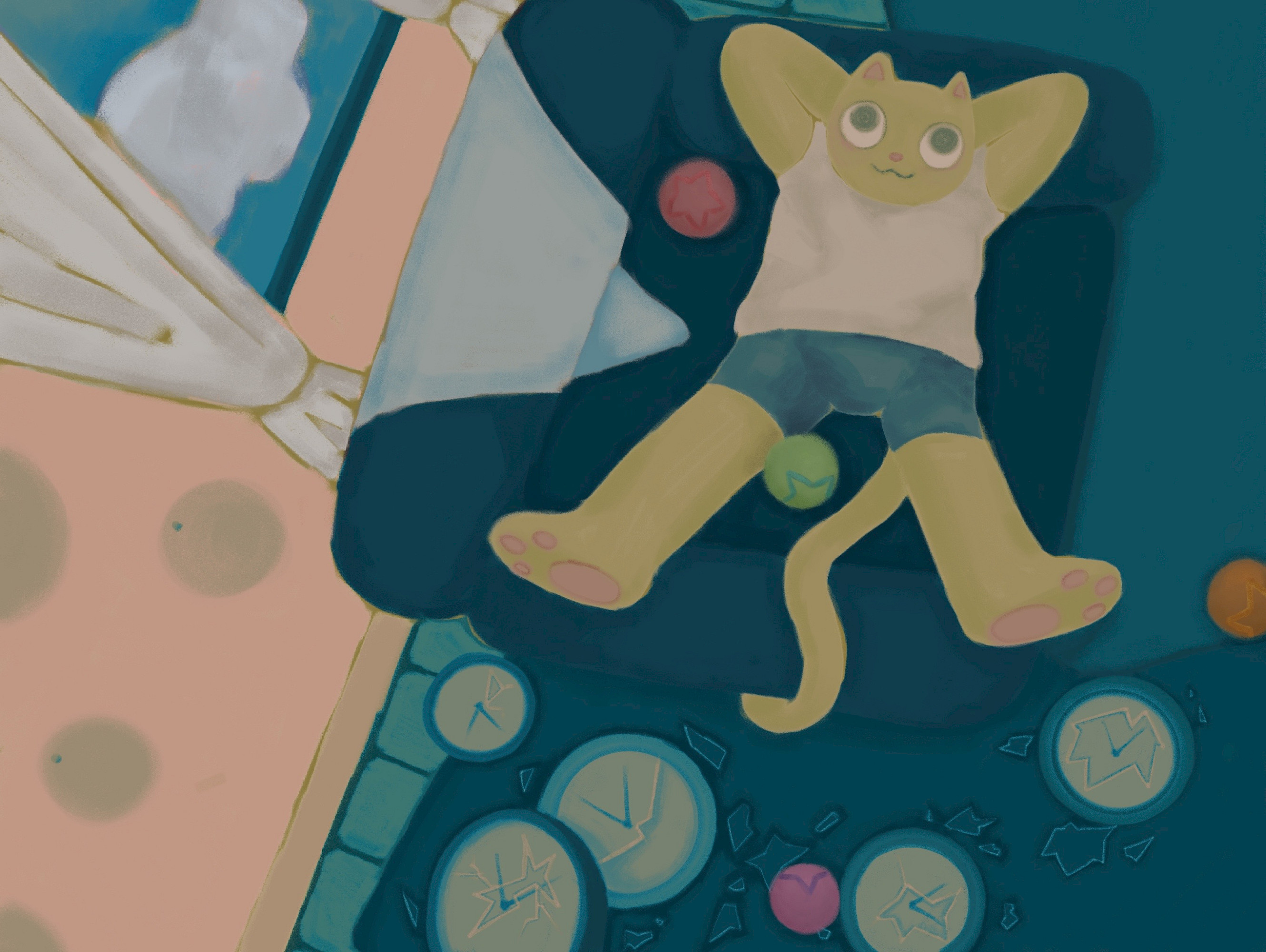
Editor's note: this essay was commissioned alongside Sondi's work Mbombo: Dream Echoes. After reading, be sure to download the game and explore the world of idleness – of Black rest – as imagined by Sondi and her collaborators.
“Then with whom should I best think and talk about idleness, but with myself?” writes the romanticist writer Friedrich Schlegel in his avant-avant-garde novel Lucinde, published in 1799 [1]. He likes to muse about idleness and proclaims that it should be elevated towards “art, science, yes even religion!” [2]. This conceptual force field that is unfolded between these two assertions will also occupy my thinking in this text about idleness: how idleness can be a private matter, best discussed with oneself, and how it is also of interpersonal relevance, like art, science, or religion.
But first things first. What is idleness? And why should we bother thinking about it?
Idleness and idler – an idle person – are antiquated words, out of common use, that seemingly have no connection to contemporary times. Maybe the context in which one has read or heard about them were old proverbs like “idle hands are the devil’s playground” or “idleness is the root of all evil”. In a more technical sense, we speak of idling cars, when the motor is running but the car is at a standstill. This pejorative, fragmented connotation of idleness is maybe all that is left in our minds of this formerly complex concept. It stems in huge parts from our socio-economic history and the ideological stance towards ingraining work as a virtue, and from a game of condemning leisure that especially certain Christian sects have played to cement this virtue into our cultural subconscious. As pars pro toto [3] can be seen in the analysis of Calvinism by Max Weber [4], monetary success is equated to be a chosen one by God, which resulted in a religiously driven work ethic. Weber quotes from a letter by Benjamin Franklin to his not so successful brother: “Remember, that time is money. He that can earn ten shillings a day by his labor, and goes abroad, or sits idle, one half of that day, though he spends but sixpence during his diversion or idleness, ought not to reckon that the only expense; he has really spent, or rather thrown away, five shillings besides”[5].
Though ora et labora, pray and work, is the motto of the Benedictines, the medieval Catholic Church in general was not work-obsessed. One glance at the Catholic holidays – holy (saints’) days – in the 13th century lets us grasp the scope of downtime afforded to medieval workers: by some accounts, holidays reached over 100 days per year. Of course, this must be taken with a large grain of salt, because there was always work on a farm, and the holiday may only have been a temporary break from compulsory labor for a feudal lord. The so-called vita contemplativa, a life dedicated to spiritual occupation, was highly valued in medieval times, whereas vita activa, a life invested in worldly affairs, wasn’t regarded as improved. But we still won’t find a praise of idleness as a cultural beacon in the West in this period of history.
“We are taught to work, but we are not taught how to be idle.”
Real praise for idleness can be found earlier, in the ancient Greek and Latin usages. Ascholia (Greek) literally means the absence of drudgery and the Latin otium denotes rest, dilution of time and leisure. In these ancient usages, idleness was a privilege to be had only by the privileged. When Cicero writes about that he is looking forward to enjoying his idle time in the summer when the senate is closed, and he can move for a couple months to his country estate, he is writing as a member of the political elite. Idleness was a privilege for the ruling classes through to modern times – until the birth of the bourgeoisie in the 18th century opened traditional privileges to new strata in society. And with these new budding freedoms came dreams of realizing them, imagined also in the products of a newly-invented job – the professional novelist, like Friedrich Schlegel.
Becoming an idler
When I was a teenager I stumbled upon the German word for idleness, Müßiggang, and its descriptor for a person who’s idling, an idler, (Müßiggänger). Something in these words was exciting. Maybe it was the antiquated sound, maybe the hint of something that is a bit taboo – but once I set my mind on the word, it stirred my imagination of what a life as an idler could be. I was drawn to find fellow idlers in novelists, thinkers, artists. Soon enough, though, I began to stumble over conundrums and contradictions when trying to match my intuition in what idlers do and who they are with the realities of the neoliberal, Western society I lived in. Daydreaming seemed to be a good activity for idlers. What about watching TV for five hours straight? Something felt off about this activity. But why? I soon found out that my idea about idleness was forming on the one hand around curiosity and discovery, as found in the figure of the flaneur, who drifts seemingly aimlessly through the big city, following his thoughts and his spontaneous intuition. And on the other hand, I was intrigued by the communal possibilities of idleness. This is much more complex than following one’s own inclinations. Here I got inspired by the literary salon culture of the 18th century, where a set of values – to be witty, interesting, and courteous – helped to bind groups of people for stimulating get togethers over long periods of time. A lifetime of idle curiosity – and curiosity about idleness – began.
But again: what is idleness?
At the base of all idle activities, the zero-point is doing nothing. From this base, which is also the anthropological backdrop that is necessary to talk about activities, one can develop more ideas that determine more closely what idleness could be.
Doing nothing can be also a potent concept of change, for example in resisting work, as immortalized in Melville’s “Bartleby the Scrivener” and his infamous retort “I prefer not to” when asked to do his job by his boss. But my concept of idleness focusses on other aspects. Here are some hypotheses that should lead the exploration of idleness:
Hypothesis 1: Idleness is a self-chosen activity.
Hypothesis 2: Idleness is a cultural product.
Hypothesis 3: Idleness is necessary for gaining knowledge about the world and the self.
Hypothesis 4: Idleness describes a distinguished aesthetic mode.
And there are two conditions that are necessary for idle activities:
1: Idleness needs leisure time, time with no pressure.
2: As a self-chosen activity that can’t be ascribed.
Furthermore, I want to focus on a certain kind of idleness that can be described as ‘being productively unproductive’. This oxymoron helps us to distinguish the flavor of idleness in two more systematic ways. For one it cuts a line between idleness and ‘simple’ rest and laziness [6]. And it also emphasizes that there are activities outside of work that have a productive value. Being idle in the world creates a different epistemological path towards the world – not guided primarily by reasoning and deduction, but by en passant impressions. It emerges from a more detached open exploration without having an end-goal in mind.
The state of idleness reminds us to change perspectives and to re-discover the multiple constructed and layered facets of our experience of life.
Idleness and Work
Idleness seems to be a private endeavor. But its photonegative twin – work – is never far away from its side. In a society where work is morally embedded as a core value, idleness is shunned. This can also be observed in the way certain wording is used for self-attribution and ascription. A hard-working person can still be relatively sure that this descriptor is received as a positive mark of character whereas being idle or lazy isn’t. Somebody called a lazy person ascribes a pejorative meaning to it.
I think that this specific relation between idleness and work doesn’t have to be the way it is out of logical necessity. As mentioned, idleness is mostly used in the examples in a semantic field that is connected to work and work ethics. One could say that idleness and work are two poles of human existence. We are taught to work, but we are not taught how to be idle. And it seems intuitive that way when we don’t see formations of idleness as cultural artifacts. The biggest idlers in the world – human beings with no schedule, tuned into their immediate surroundings, who learn every waking minute about the world and themselves – are little children. What comes as a prerequisite to learn and evolve is getting vaulted by our social, psychological, and intellectual evolution. We learn cultural techniques, like how to absorb information and reproduce knowledge in school, how to interact in certain settings etc. The sociologist Hartmut Rosa describes a phenomenon of receiving positive feedback in our interaction with the world as ‘resonance’ [7]. Its opposition is set as alienation from the world. I think resonance is good descriptor of the full experience when we interact in a meaningful way. The idler can be seen as someone who is sounding for resonance – they search for more and more places where to find it and restore alienated plots for future resonating interaction.
At the base of all idle activities, the zero-point is doing nothing. Doing nothing can be also a potent concept of change, for example in resisting work.
Increasing productivity, increasing leisure?
In 1930 the economist Maynard Keynes published a paper concerning the development of productivity and what the greater social impacts could be [8]. Over a 100-year horizon he projected that with a very modest productivity gain of 2% per year, the productive capacities of Great Britain would be so high that workers would only need to work for four hours per week in 2030. New challenges would arise, such as – what to do with all that leisure time? But somehow, we didn’t have to face these gruesome challenges of having to deal with such a crass work-time reduction. What happened? Did Keynes just make a wrong prediction concerning the productivity gains? He didn’t. Au contraire: A study from 2008 by Harvard economist Gustavo Pigashowed that he vastly underestimated the productivity gains that were on average at around 8% [9].
But working hours didn’t decrease. Although workers’ rights haven’t declined on paper, a vast array of declines can be seen in self-exploitative hustle culture, precarious employment, and the undermining of leisure time by being forced to be always available. Sadly, there’s not enough room to talk in depth about the neoliberal turn in western politics starting in the 1980s, connected to Reaganomics in the US and Thatcherism in the UK, broad neo-liberal reforms that reduced taxes of the wealthy, privatized public infrastructure, and weakened workers’ rights. Since then, the growing GDP didn’t relate to a growth in most workers’ wages, which kind of stagnated from there on and led to an unprecedented widening of the wage gap. But also, some other implications may be found in this observation. For example, why were these anti-social politics implemented and are still seen in high regard, or at least acceptable?
After a successful 150 years of workers’ rights improvements, this streak stopped, and even appeared to shift into reverse. But the situation is the same, and even rosier than Keynes had imagined it: productivity is so high that we could work a little less without it affecting our wealth. That we can’t dodge this discussion forever can be noticed by a wider acknowledgment that a universal basic income (UBI) is becoming more and more urgent – when just 10 years ago, political professionals were laughing at the idea. And the reason why a UBI seems to be inevitable, at least from Silicon Valley’s point of view? AI and advanced robotics will be much better and cheaper at a lot of jobs than human beings. Capitalism is forcing its workers into obsolescence. We are heading towards a crisis of values if paid work must leave its prime position of generating meaning.
And so, the question emerges: what kind of society do we want to live in? Embracing our idle side, this change could be an opportunity for a more humane society.
Self-image and projection
We tend to project our defense of our status quo into our prehistoric view of ourselves. A good example is Rousseau’s idea that property ownership originated and stopped us, through a social contract, from being ‘savages’ caught up in eternal conflict. A good account on the myths underlying our economic systems can be found in David Graeber’s Debt: The First 5000 Years (2011).
Another one of our presumptuous projections lies in judging quality of life. There was for a long time a consensus in anthropology that overall quality of life increased greatly since moving on from being hunter gatherers and settling down as farmers. Life then, from the settled down perspective, seemed to be cruel, full of hunger, illness, cold and misery in ancestral times. Then new research was conducted in the 1970s, where anthropologists started living with several hunter gatherer tribes for longer periods and collecting data. The astonishing outcome was that in most of these Indigenous societies, members were not threatened by the destruction of their land and lived very good lives according to quantitative measurements. For example, members of a sub-Saharan tribe had a surplus of calories (>2000 kcal/day), were generally healthy, and reached old age [10].
Those examples should illuminate that we tend to press our self-images into molds. For instance, the idea of Homo economicus seems to explain a lot about how we function in a simple model. But what about other simple models that also explain a lot, like the Homo politicus, or Homo ludens, or Homo narrans? Those are also powerful concepts to explain human nature. As a faceted ensemble they shine a light on a multi-dimensional human being – one who plays, tells stories, builds a communal society based on consensus. Taken alone, however, each just pushes us into the problems of essentialism. Understanding humanity from an economic point of view is powerful. Social evolutionary theories that explain our motivations behind our actions are insightful. But they do not give a complete picture. They give stunning results to explain how we got here, but they do a lousy job of calling us to action, of convincing us to strive towards a realization of societies that feature more ‘human’ aspects. We can describe social interactions as purely transactional and looking forward to one’s own advantage. But then we are missing out on some of the biggest features of being human. What about grief, happiness, friendship, curiosity, memory, appreciation of beauty…?
In this essay I don’t want to call to repeat common epistemic errors and sing the high evangelion of an idyllic idleness that will solve all our problems. Neither do I propose that we call ourselves Homo idlensis and only perceive us through that lens. But what I do propose is to acknowledge the deeply valuable idle side of us and give it more space in our conscious thinking and acting. Publicly and actively embracing our idle side instead of hiding it in the private sphere, we get the chance to eventually build better societies that have a deeper focus on aesthetic modes and community.
Idleness as a productive aesthetic mode
In classical aesthetic discourse [11], to be able to appreciate art, you need to enter into a dialogue with the artwork. To let it speak to you, you need to cleanse yourself as much as possible from any intentions towards or expectations of the work. Only then will you get the chance to resonate with the work, to have an aesthetic experience. This procedure is congruent with the stated conditions of being idle. Immanuel Kant sees the epistemic workings in this aesthetic mode in a special usage of the faculty of judgment. Judgment, in its usual usage in the cognitive mode, is used in a deductive manner, helping to fuse perceived phenomena with concepts. Something brown and upright with some green on top – a tree. But we don’t use judgment to stamp the phenomena with concepts as quickly as possible, but rather withhold judgment, we let the phenomena steep and give them room. And sometimes we experience beauty.
This inductive use of judgment faculty after Kant, and also withholding judgment on a more synthetic level (what Edmund Husserl calls epoché; e.g. This tree is ugly) brings us into a state of disinterested interest in productive unproductivity. This aesthetic mode must not be narrowed and bound to interaction of sanctioned museal art or natural beauty, but shall be exercised everywhere, alone and in company. The idler tries to blast the confinement of aesthetic experience wide open and apply it to the entirety of what there is to experience. Tuning into this mode also gives us a unique firsthand experience. We will know a lot about this specific tree we looked at, or that street cat we just took time to pet. We are giving attention to the world around us and getting to know it.
And it also works in a social setting. We are not trees, objects that we can only appreciate through their bodily existence. As social beings with personhoods we want to show how we think and feel about the world. The idler applies his uninterested interest in a social form, which could be voiced as ‘I’m interested in what you are interested in’. Of course, those should be seen as regulative maxims which will take concrete cultural forms. Social forms around the interest in the interests of others were once cultivated in the wit of 18thcentury salon culture, where a friendly and open interaction was encouraged. Both salon guests and hosts were entertaining, reasonable and open to be reasoned with.
Aesthetic cloaking of idleness
One reason I feel the need to write about idleness lies, again, in its obscurity. And this obscurity is not in the fact that it’s an out of fashion topic, nor that it is obsolete. Also blaming our work culture alone won’t tell the whole story. Indeed, there is a similar reason why work culture is present in our minds and cultures of idleness aren’t.
But there is a second reason that is harder to grasp but lies structurally in the way of aesthetic representation. If we tell a story, may it be real or fictional, we are telling about events that happened. Events constitute a story. Retelling work in words or pictures will create in most cases a bigger event count than retelling an afternoon of idle thoughts. Although not entirely true, because I can imagine a riveting retelling of the exploration of a mind (and aesthetic depictions of such modes have been done, e.g., Ulysses-style stream of consciousness), but it requires openness and interest on the receiving side, which more worldly events don’t have to fight for. Thus, unproductive modes of being tend to be aesthetically underrepresented.
And here the project of idleness is growing some critical teeth. When I said earlier that in a social setting idleness is ‘interested in the interest of others’, we can see its cultural impact.
This impact is in this sense normative because it strives towards a value that it sets out before. Driven by the value in a social setting fosters the formation of a cultural technique, e.g., a certain way to communicate, a certain way to approach known/unknown/familiar/loved people etc. By increasing idleness-forward interactions, we will form communities with a different culture of communication, in which we may be also more inclined to listen to uneventful stories and encourage others to dip into more idle experiences themselves.
Putting an emphasis on an open and explorative mode of living, the idler is an adventurer, cultivator, and enjoyer of a resonating life. Shared with others, idleness is a wonderful indication for a good life in society.
References
[1] Friedrich Schlegel, “Lucinde” and the Fragments, trans. and intro. by Peter Firchow (Minneapolis: University of Minnesota Press, 1971). The quote is translated by the author from the German original.
[2] Ibid.
[3] When a portion of an object, place, or concept is used or taken to represent its entirety.
[4] Max Weber, The Protestant Ethic and the Spirit of Capitalism [Originally published 1930]. London and New York: Routledge Classics, 2001.
[5] Benjamin Franklin, “Advice to a Young Tradesman [21 July 1748]”, in George Fisher, The American Instructor: or Young Man’s Best Companion. … The Ninth Edition Revised and Corrected. Philadelphia: Printed by B. Franklin and D. Hall, at the New-Printing-Office, in Market-Street, 1748. Pp. 375–7. (Yale University Library).
[6] A sophisticated rest-movement with political ambitions and a needed introduction of race and class into the conversation comes these days from Tricia Hersey, author of Rest is Resitance. Free Yourself from Grind Culture and Reclaim Your Life. London: Aster, 2022.
[7] Hartmut Rosa, Resonance. A Sociology of our Relation to the World. Cambridge: Polity Press, 2019.
[8] John Maynard Keynes, “Economic Possibilities for our Grandchildren (1930),” in Essays in Persuasion (New York: Harcourt Brace, 1932), 358-373.
[9] Lorenzo Pecchi and Gustavo Piga, Revisiting Keynes: Economic Possibilities of our Grandchildren. Cambridge: MIT Press, 2008.
[10] James Suzman, Work: A History of How We Spend Our Time. London: Bloomsbury Publishing, 2021.
[11] See: Immanuel Kant, Critique of Judgment, 1799.
